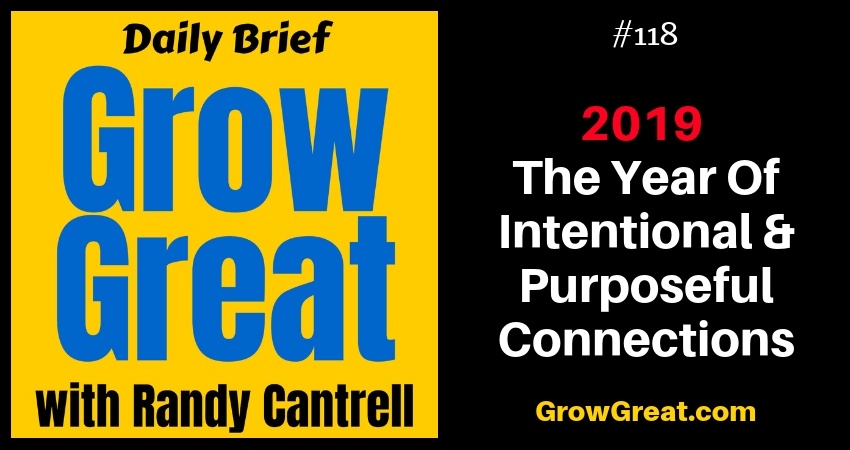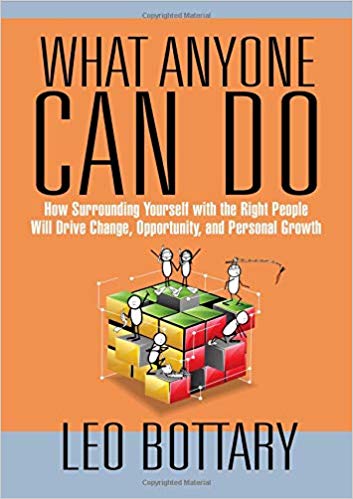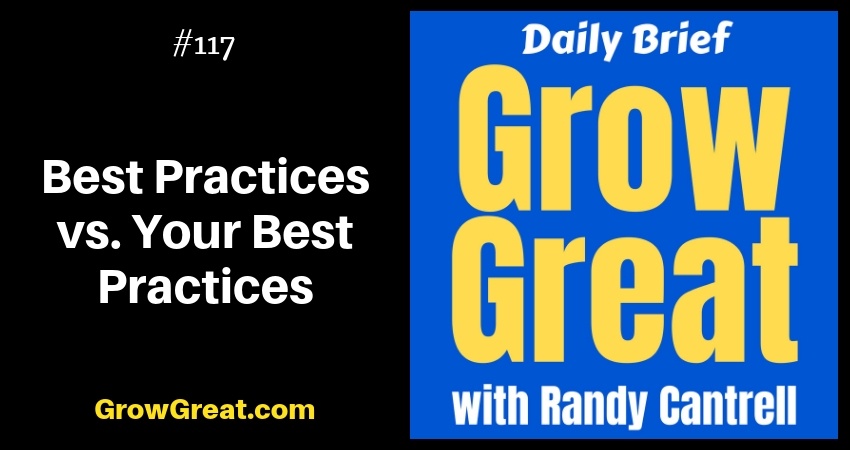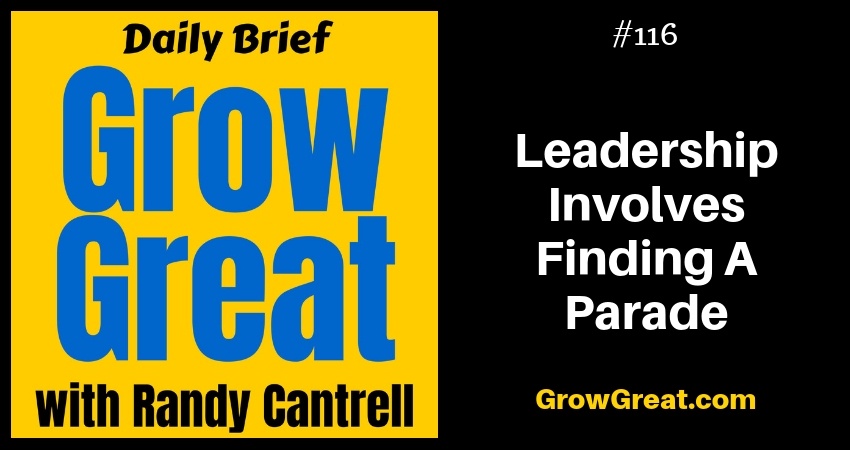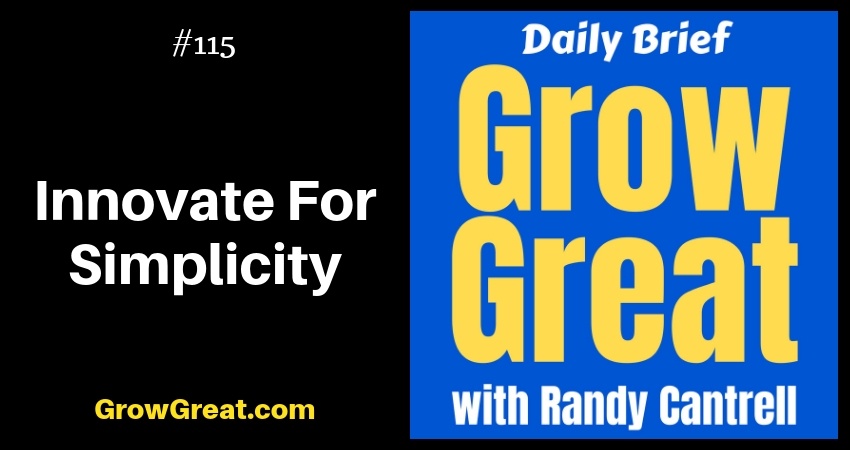Fun With Budgeting (Part 2) – Grow Great Daily Brief #120 – December 11, 2018
Podcast: Play in new window | Download (Duration: 14:19 — 13.6MB)
Subscribe: Apple Podcasts | Spotify | RSS | More
Yesterday we talked about how as the CEO or business owner you may want to hole up and do four quick passes through the budget with some hi-liters. RED is NO. GREEN is GO. YELLOW is I Don’t Know.
It’s a good idea to have your leadership team follow suit with whatever you do. In this case, I want my team to do the same thing so when we come together we can more easily discuss each line item. If you’re doing things one way, and each person on your leadership team is doing something different, it can make the conversation more difficult. Not impossible, just more difficult. But do whatever works best for you and your team.
The major point I want you to consider is “putting everything on trial for its life.” Make each line item live and die on its own merit. Be relentless.
I’m not terribly fond of cost containment. I more fond of cost squeezing. “Cost creep” can stop you in your tracks. It’ll derail momentum if you don’t incorporate the ongoing habit of the relentless pursuit of profits.
Don’t be stingy. Be frugal. There’s a difference.
Budgeting demonstrates values. Specifically, the budget will display what YOU value. I can glance at a budget and determine if the owner cares about developing himself or herself. I can glance at it and see if the owner cares about developing employees. I can spot where the owner may have some paranoia or special concerns. I can spot where the owner has pet indulges, too. It all comes out in the wash.
Well, let’s pick up now with your meeting with the leadership team. I’m not terribly fond of making this a marathon endeavor. That is, I don’t care to have meeting after meeting after meeting about budgets. Truth is, I don’t care about having meeting after meeting after meeting about much of anything. Meet as often as you need to, but don’t meet any more than you have to. The key is to prepare BEFORE you meet.
If I’ve gone through the list 4 times and each member of the leadership has gone through it 4 times, then we’re ready to meet. I know my speed going through the list 4 times doesn’t likely look like theirs because they’ve each got things they’re willing to fight for, and perhaps other things they’d like to fight against. But hopefully they care about each other and we can enjoy a civil, even vigorous debate. I encourage it. Remember the goal is to put each line item on trial for its life. That won’t happen if everybody enters the room without the courage to fight a little bit.
I don’t foster the fight, but I do work intentionally to build a safe environment where we all know we’re not there for any reason other than to make the company as great as it can be. Egos need to be left behind. Budgets aren’t about pushing forward somebody’s career agenda or anything else. They’re about utilizing resources to help the company grow. As the lion tamer in the room, my job (your job as the CEO and owner) is to make sure the lions behave. Serve them well. Keep everything safe so people can fully express themselves. And don’t shut down disagreement. Debate and disagreement can (and should) happen without thinking it’s detrimental. Disagree, but don’t be disagreeable.
The Team Meeting
Everybody should be fully prepared for the discussion. Put a time limit on the meeting. Start on time. Stop on time. Set aside whatever time you think may be needed. It’s wise to ask the team how long they think they’ll need. Let everybody know in advance. Hint: this meeting may very well be a full-day meeting. It depends on the size and complexity of your business. I suggest you limit it to one full day, but make it shorter if you can.
You can begin anywhere you’d like. Just lead. Don’t take a vote or you’ll start the session debating about the least important things. Set the tone and pace.
I just have everybody start with a clean, unmarked list along with their own marked list. I don’t make color copies of my 4-pass-results because I want the interaction and I want each person fully engaged. Staring at a list of what I’ve done is different than looking at a clean copy, listening to me go through each pass. They’re paying much closer attention by having to notice which color I assigned to a line item.
RED is NO. GREEN is GO. YELLOW is I-Don’t-Know. And no color means I don’t think it needs any adjustment.
All four areas get discussion if any member of the team wants. I’m not dictating the elimination of discussion. Every line item is on trial for its life.
I go through all four passes with the team making their notes, marking their clean copy to match my own. By the time I’ve reviewed all four passes with them, I’ve now gone over it four times by myself and four times with the team. I’ve also now been able to articulate the four passes. There’s value in all that. For me and the team.
I’m then going to start with RED for the discussion. Line by line we go through the RED hi-lighted items.
Some team members will agree. Some won’t. Let the discussion move forward. Push every team member to listen carefully to the thoughts and ideas of others…with one goal – TO UNDERSTAND. We want to understand each other as fully as possible. Yes, this is easier said than done, but if you insist on it and handle moderating the conversation well, it can happen.
There’s one trick I’d encourage you to deploy. Get a small hourglass that is a lot less than an hour. Three minutes. Five minutes. Whatever suits you. Once you launch the conversation about a specific line item turn over the glass so the clock is ticking. Here’s the rule: When the sand has completely run through the glass, we’re going to take a vote. Do we want to devote more time to this item right now? Do we want to move on with agreement on what should be done? Do we want to move on with agreement that nothing should be done? Do whatever the group decides.
The goal is to make some conclusions on every line item, but some things are going to be more complex than others. I don’t put pressure on this meeting to be our final concluding meeting. I would put pressure on this meeting to distill the list down into there being just a few (very few) line items that may demand deeper conversation. Work to get most of the budget done in this meeting. Again, your business may require more discussion, but keep in mind —- the preparation of the budget should have been interactive, meaning the team had a big hand in the preparation of the line items. It’s not like everybody is seeing these numbers for the first time. If they are, you’re doing it wrong.
I’m fond of pace. Yes, it’s partly speed, but it’s not thoughtless speed. Pace forces people to get to the point. It forces people to express themselves quickly and clearly.
After we’ve discussed an item for 3 or 5 minutes we work to consensus. If only one person wants to continue the conversation, we do it. I’m looking for a unanimous vote without pressure. Dissenters aren’t made to feel bad.
You’ll find that some line items won’t take up the entire time on the “hourglass.” Others will take longer. That’s okay.
Try to get through the RED, then take a break before moving to GREEN.
Rinse and repeat. Do the same thing through GREEN, then take another break before going to YELLOW.
Then do the final pass. The objective is to produce a budget that won’t be the final version, but one that will lead to the final version. Don’t rush through this pass because this is often the most important pass.
All along the way people will have debated their cause, explained why they disagree, or agree. Some will have moved in their position. Others will have changed completely on a few things. Again, keep preaching the point…
To Put Every Line Item On Trial For Its Life
One other vital point – push the vision and mission of the company in the budget. Don’t allow anybody to spoil that. If developing people matters to you and somebody wants to cut or eliminate investments in programs that do that because they’re looking for money to support something else, you must remain true to what matters most. Explain it. Preach it. If necessary, impose your will. But hopefully your leadership team is completely on board with you and your vision (that’s how it should be), that you don’t have this problem.
By the time you work through the 4th pass of the budget with your team everybody should be prepared to then go back to work out the final numbers. Encourage them to do this. I prefer to have them do it without my involvement. Mostly because I want them to own it and I feel I’ve now done my job of pushing the debate forward. From here on out, I’m going to trust them. You do whatever you need to do.
Get the final numbers in place. Get complete agreement. It may mean somebody surrenders something, but that’s okay. You want every member of your leadership team to sign off on the final numbers. Not pressured to do it, but to honestly be agreeable that these final numbers are the best numbers for moving the company forward.
It’s fine if the team wants to debate it amongst themselves some more. Leave them do whatever work they want to do. Put somebody, likely your CFO, in charge of leading the parade. Give them a deadline. Make it reasonable, but quick. Don’t let this drag out. Remember our title, FUN with budgets. We want this to be meaningful, profitable work – not sheer drudgery.
Be well. Do good. Grow great!
Fun With Budgeting (Part 2) – Grow Great Daily Brief #120 – December 11, 2018 Read More »


